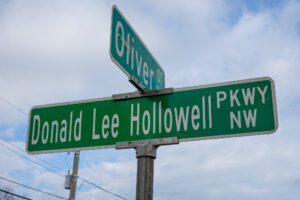Atlanta’s historic Westside is a living testament to the city’s rich past and enduring legacy. Throughout the community, streets and landmarks tell the stories of trailblazing leaders whose contributions shaped Atlanta—and the nation.
In honor of Black History Month, we are launching a blog series exploring the namesakes of four significant streets that run through the historic Westside. In this issue, travel down Donald Lee Hollowell Parkway, a prominent thoroughfare stretching through the historic Westside and steeped in history. Formerly known as Bankhead Highway, the street was renamed in 1998 to honor Donald Lee Hollowell, a civil rights trailblazer whose legal expertise helped dismantle racial barriers across Georgia and beyond.
Hollowell’s Role in Civil Rights
As one of the few Black attorneys practicing civil rights law in the 1950s and 1960s, Donald Lee Hollowell took on cases that reshaped Georgia’s legal landscape. He successfully litigated the integration of the University of Georgia in 1961, representing Hamilton Holmes and Charlayne Hunter against the state’s segregationist policies. This landmark case not only broke barriers in education but also set a precedent for the desegregation of other institutions across the South.
Hollowell’s legal work extended beyond the courtroom. He provided counsel to student activists during the Atlanta sit-ins, defended Martin Luther King Jr. during the Albany Movement, and played a pivotal role in securing the release of activists who were unjustly imprisoned. His courage and skill in the face of systemic racism earned him the respect of his peers and the admiration of younger civil rights leaders, including Vernon Jordan and Horace Ward.
In 1966, President Lyndon B. Johnson appointed Hollowell as the first Black regional director of the Equal Employment Opportunity Commission (EEOC) for the southeastern United States. In this role, Hollowell continued his fight for equity by addressing workplace discrimination and increasing opportunities for African Americans across the region.
A Street That Carries a Legacy
Renamed from Bankhead Highway in 1998, Donald Lee Hollowell Parkway serves as the northern boundary of English Avenue, a historic neighborhood that has been home to cultural movements, iconic musicians, and memorable contributions to Atlanta’s identity.
Hollowell lived nearby in the affluent and historic Collier Heights neighborhood. Once a bustling corridor during the mid-20th century, the parkway experienced a decline in the 1970s as suburban sprawl drew resources and people away from urban centers. For decades, Donald Lee Hollowell Parkway bore the brunt of disinvestment, but today, revitalization efforts are underway to restore its vibrancy and honor the legacy of “Mr. Civil Rights.”
Revitalization and Reflection
Today, Donald Lee Hollowell Parkway is at the heart of efforts to revitalize Atlanta’s Westside. Community-led initiatives and investments aim to bring new energy to the area while honoring its history.
Westside Future Fund is currently leading several projects on or adjacent to the thoroughfare, including the preservation and restoration of the historic English Avenue Carnegie Library. Plans for the building include repurposing the structure as a commercial space as a resource for the community.
Just a block away at 646 Echo Street, WFF is leading the construction of a multifamily development that will bring 24 high-quality, affordable rental units. The project will include two buildings standing three stories, and all units will rent at below market rates—half will be reserved for renters earning 80 percent of the area median income or less, 30 percent will be held for occupants at 60 percent AMI, and five apartments will rent for just 30 percent AMI.
Just a couple blocks north stands 970 Jefferson Street, the headquarters of Westside Future Fund and a collaborative nonprofit hub home to eight other organizations committed to transformational community service work in Atlanta.
As these efforts unfold, Donald Lee Hollowell Parkway remains a physical and symbolic reminder of Hollowell’s work. His legacy is not only one of dismantling barriers but also of building pathways for future generations to thrive.

